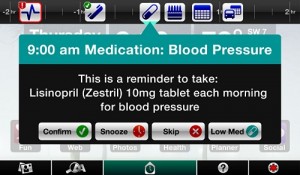
Screenshot from Independa's Angela tablet
Welcome to the world of private-label and single-purpose tablet computers for healthcare. Less feature-packed and powerful than the segment-leading iPad, these lower-cost computers are being positioned by at least two companies as control panels for remote and home monitoring systems.
Back at the beginning of the year, at the International CES show, Ideal Life, a Toronto-based vendor of remote monitoring technology for care management, announced Health Tablet, a control panel of sorts that syncs data between home-based patient monitoring devices and health information systems such as electronic health records. Last week at the eighth annual Healthcare Unbound conference in San Diego, Ideal Life Director of Business Development Steve Wheeler said that the tablet should hit the market by September.
The Android-based tablet will be a "dedicated, low-cost device," specifically designed to work with Ideal Life monitors, said Wheeler, who is in the process of establishing a U.S. headquarters for the company in suburban Dallas. "We want it to be simple for our users," he said.
That is similar to the strategy that Independa is adopting for its tablet-based system. The San Diego-based company is beta-testing an off-the-shelf Windows 7 tablet as a control panel for "Angela," a recently introduced interface meant to be simple to use for elderly patients wearing wireless sensors and the family members and caregivers who monitor them remotely.
"There's no computer experience required," Independa marketing representative Julie Kuhlken told MobiHealthNews at Healthcare Unbound. Angela features large fonts, bright colors and one-touch access to applications such as video chats, e-mail, Facebook and games.
Similar to Health Tablet, Angela is meant to allow frail elderly and others with multiple chronic diseases to remain at home rather than being shipped off to assisted living or a nursing home. It sends automatic reminders when it's time to take medications, and provides confirmation via e-mail, voice or text to caregivers. Caregivers also can schedule regular voice or video calls to check in on the patient, Kuhlken said.
And like Health Tablet, the Independa product can be interfaced with EHRs so sensor readings are automatically sent from home-based monitoring devices.
This is exactly what Majid Sarrafzadeh, co-director of the UCLA Wireless Health Institute, recommended during a Healthcare Unbound session. "Our approach is all about end-to-end integration," Sarrafzadeh said.
Based on 10 studies that UCLA researchers have either conducted or examined, Sarrafzadeh has concluded that remote monitoring has to be easy to use for the patient and seamless for both patient and care provider. "A weight scale has to look like a regular weight scale," he said. It can't have extraneous parts or wires, and data must be transmitted in real time. "Even it's not being reacted to, the fact that they know it's being watched 24/7 is very important," said Sarrafzadeh, a professor of electrical engineering at the Los Angeles school.
Kuhlken said to expect general availability of Angela in September. Users will purchase the tablets and pay a monthly subscription fee for Angela service, Kuhlken said. Initially, Independa will sell a 10-inch screen, just a hair larger than the iPad, but there are plans to add a touch-screen tablet in a 22-inch format.

















